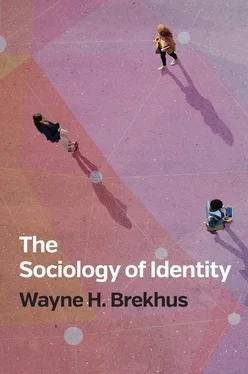In chapter 2I look beyond the individual, to discuss the many collective forms that identity takes. Identity is constructed not only in individuals but in collective social forms as well. Nations, communities, social movements, subcultures, families, generations, professions, and organizations form and build identities and have identities attributed to them by others. This chapter emphasizes several forms of collective identity. Examples include national identities, subcultural identities, social movement identities, city identities, neighborhood identities, organizational identities, and ethnic and racial category identities. These examples will highlight non-individual ways in which we construct identity. Key concepts discussed in the chapter will be collective identity, the identity of collective social forms, imagined communities, social movement identity, organizational identity, place identity, and communities of belonging.
Chapter 3looks at identity boundary work and negotiations of authenticity. Performing and defining the authentication of one’s identity are two of the ways in which we erect boundaries of inclusion and exclusion and boundaries of belonging and not belonging. Analyzing the authenticity of identity across a range of contexts and across different levels of analysis highlights ongoing issues of boundary building and maintenance. The chapter will explore authenticity, authenticity disputes, symbolic belonging, and inclusion and exclusion work across a range of identity contexts, demonstrating that collective and individual performances of authenticity are an important part of identity boundary maintenance and exclusion. Key concepts addressed are identity authenticity, self-authenticity, “false” and “true” selves, group authenticity, negotiating identity, subcultural capital, identity disputes, contested identities, ethnic fraud, and ethnic authenticity.
How do we negotiate multiple identities? How do power, privilege, and marginality intersect and shape the presentation of identity and the patterns of inclusion and exclusion? In chapter 4I will focus on the multidimensionality and intersectionality of self-identities and collective identities. Intersectional analysis in the sociology of identity draws on foundational traditions in feminist standpoint theories (e.g. Smith 1987; Crenshaw 1991; King 1988; Hill Collins 2009) as well as on “social mindscape” cognitive sociological traditions (see Zerubavel 1997; Brekhus 2007), which in turn explore Simmel’s (1969) interest in webs of intersecting identity affiliations and multiple standpoints. While social interactionist perspectives emphasize the social nature of identity by locating it within the social context, social standpoint intersectional perspectives add to our understanding of the social nature of identity by introducing social power and social location . Social location refers to the position where the demographic and social characteristics of a person, a social group, or a community place them within a status hierarchy. Our social selves are composed of competing group and demographic attributes, which correspond to different forms of politics of inclusion and exclusion and to various degrees of privilege and stigma. Modern identity scholarship is increasingly interested in the multidimensional character of identities, especially as this multidimensionality relates to social inequalities. Chapter 4will highlight this property of identity and the negotiation between unmarked normative privilege and marked, accented marginality in identities, examining the multiple influences on identities and the interactional presentations of multidimensionality. Key concepts featuring there will be multidimensionality, intersectionality, social standpoint, marked difference, accented particularization, non-inclusive universalization, unmarked privilege, and the interactional reproduction of social inequalities.
The fundamentally social nature of identity means that it is not only complex and multifaceted, as is modern social life itself; it is also fluid and shifting in a multicontextual world. Identity is a multidimensional resource deployed across a plurality of social contexts. In chapter 5I will look at how multidimensional identities are mobile and transitory across time and space and are deployed as shifting resources by the multifaceted social actor. Identity is mobile and individuals can draw upon context and specific forms of cultural capital, which are valued as identity currencies in some settings and devalued in other settings. The chapter highlights the strategic deployment of identity across time and space, emphasizing the mobile, fluid nature of multiple identities. The previous concepts of identity authenticity and multidimensionality, addressed in chapters 3and 4, are here understood in relation to the ways in which we use time and space to organize authenticity and multidimensionality. Key concepts discussed here are identity mobility, fluidity, identity currencies, place-based identities, and temporal identities.
In the conclusion I focus on the relationships between identity authenticity, multidimensionality, and mobility, discuss research that reflects on and elaborates on these relationships, and invite you, the reader, to examine your own identities and the social groups that forge them.
Конец ознакомительного фрагмента.
Текст предоставлен ООО «ЛитРес».
Прочитайте эту книгу целиком, на ЛитРес.
Безопасно оплатить книгу можно банковской картой Visa, MasterCard, Maestro, со счета мобильного телефона, с платежного терминала, в салоне МТС или Связной, через PayPal, WebMoney, Яндекс.Деньги, QIWI Кошелек, бонусными картами или другим удобным Вам способом.












